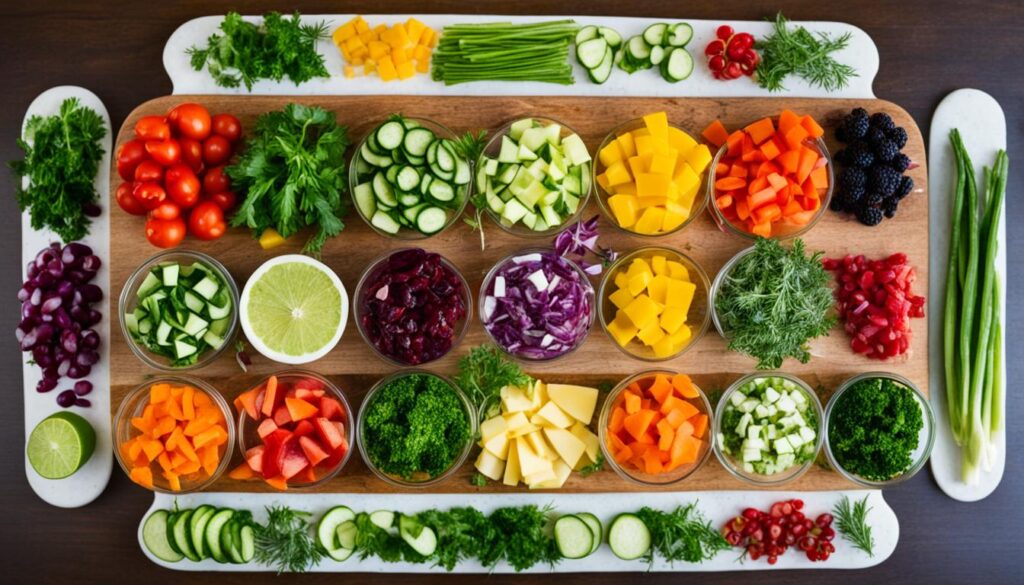Menu planning is a helpful practice that can save you time, money, and stress while ensuring you have healthy and delicious meals throughout the week. By following some simple tips and strategies, you can create a menu plan that works for you and your family.
Key Takeaways
- Menu planning can save you time, money, and stress.
- Take inventory of your pantry, freezer, and refrigerator before planning your meals.
- Consider your time constraints and choose quick and easy meals for busy days.
- Organize your grocery list by store section to make shopping quick and easy.
- Select recipes based on common ingredients to minimize food waste.
Tips for Effective Menu Planning
To effectively plan your menus, follow these menu planning tips that will help you save time, money, and stress. By incorporating these strategies into your weekly meal planner, you can create a budget-friendly and time-saving menu that meets your family’s needs.
1. Take Inventory of Your Pantry, Freezer, and Refrigerator
Before starting your menu planning process, it’s essential to take stock of the ingredients you already have on hand. By doing so, you can utilize what you already have in your pantry, freezer, and refrigerator, reducing waste and saving money on groceries. This exercise will also provide inspiration for meals you can create with the ingredients you currently have.
2. Plan Your Meals for the Week
When creating your weekly meal planner, write down your meals for each day of the week, including breakfast, lunch, dinner, and snacks. This will give you a clear roadmap of what to cook each day and ensure that you have a variety of meals throughout the week. Planning your meals in advance will save you time and avoid the stress of deciding what to cook each day.
3. Consider Time Constraints
While planning your meals, take into consideration your schedule and time constraints. On busy days, opt for quick and easy recipes that require minimal preparation and cooking time. This will help you streamline your meal preparation process and save valuable time in the kitchen.
4. Utilize Leftovers
Leftovers can be a lifesaver on busy days or when you need a quick meal option. Plan to include meals that can be repurposed or used as leftovers for the next day’s lunch or dinner. This will not only save you time but also prevent food waste.
5. Organize Your Grocery List
When creating your grocery list, organize it by store section to make shopping quick and easy. Categorize items based on their location in the store, such as produce, dairy, meat, and frozen foods. This will help you navigate the grocery store efficiently and ensure you don’t forget any essential ingredients.
6. Consider a Variety of Options
When shopping, consider buying a mix of fresh, frozen, and shelf-stable items. This will give you a variety of options throughout the week and help you avoid relying solely on perishable ingredients. Frozen and shelf-stable items can be great additions to your menu plan as they have a longer shelf life and can be easily incorporated into meals.
By following these menu planning tips, you can create a weekly meal planner that is budget-friendly, time-saving, and ensures you have delicious and nutritious meals on the table every day. Take the time to incorporate these strategies into your meal planning routine, and watch how it transforms your cooking experience.

Meal Planning Strategies
When it comes to efficient meal planning, incorporating strategic strategies can make all the difference. By implementing these meal planning strategies, you can create customizable meal plans that cater to your unique needs, minimize food waste, and promote a healthy, balanced diet.
Select Recipes Based on Common Ingredients
One effective strategy for meal planning is to choose recipes that share common ingredients. This approach allows you to make the most of ingredients you already have in your pantry, fridge, or freezer, reducing the need for extra grocery shopping and minimizing food waste. By utilizing overlapping ingredients, you can save money, simplify your meal preparation, and create more variety in your meals.
Customize Meals to Accommodate Dietary Preferences
Another valuable strategy is planning meals that can be easily customized to meet different dietary preferences or restrictions. This approach ensures that everyone in your family can enjoy the same meals while adapting them to their specific needs. Whether someone prefers a vegetarian, gluten-free, or dairy-free diet, incorporating customizable meal plans can promote inclusivity and enjoyment for all.
“One size fits all” meal plans rarely work. Customizable meal plans allow you to cater to individual tastes and dietary needs, creating harmony and satisfaction at the dinner table.
Incorporate Healthy Meal Plan Ideas
Prioritizing healthy meal plan ideas is essential for maintaining a nutritious diet. By including a variety of nutrient-rich ingredients, you can nourish your body and support overall well-being. Consider incorporating lean proteins, whole grains, fruits, vegetables, and healthy fats into your meal plans. Experimenting with new recipes and exploring different cooking techniques can also help keep your meals exciting and flavorful.
Implementing these meal planning strategies can streamline your grocery shopping, reduce food waste, and ensure that everyone in your family has access to delicious and nutritious meals. Start incorporating these strategies into your meal planning routine today and enjoy the benefits of a well-organized and health-conscious kitchen.
The Importance of Preparing Ingredients
Spending some time on meal prep can greatly streamline your cooking process throughout the week. Set aside an hour on a designated day, such as Sundays, to meal prep techniques for the week ahead.
- Chop vegetables
- Wash lettuce and herbs
- Cook proteins in advance
By doing these tasks ahead of time, you can save time during the week and avoid last-minute stress. Additionally, consider using batch cooking techniques to prepare larger portions of certain dishes that can be used as leftovers or frozen for future meals.
Meal prep is not only a time-saving menu planning strategy, but it can also be a budget-friendly approach. By purchasing ingredients in bulk and utilizing them throughout the week, you can minimize food waste and stretch your grocery budget.
Here’s a visual representation of some time-saving menu planning techniques:
| Meal Prep Technique | Benefits |
|---|---|
| Chop Vegetables in Advance | Saves time when cooking |
| Cook Proteins in Bulk | Provides ready-to-use protein options |
| Pre-portion Snacks | Helps with portion control and saves time during busy days |

By incorporating these meal prep techniques into your routine, you can make your weekly menu planning and cooking experience more efficient and enjoyable. Don’t forget to personalize your meal prep based on your preferences and dietary needs. Experiment with different recipes and find what works best for you.
Conclusion
Menu planning is an essential skill that can transform your daily cooking routine. By implementing the provided menu planning tips and strategies, you can create a customized meal plan that not only saves you time and money but also reduces the stress of deciding what to cook each day. With a weekly meal planner in place, you’ll have a clear roadmap, making your grocery shopping trips efficient and your meal preparation a breeze.
Remember, flexibility is key when it comes to menu planning. Regularly assess your plan, make adjustments as needed, and don’t be afraid to experiment with new recipes and flavors. By incorporating meal prep techniques, such as prepping ingredients ahead of time and utilizing leftovers, you can further streamline your cooking process and ensure that nutritious and delicious meals are always within reach.
Unlock the benefits of a well-thought-out menu plan. Say goodbye to mealtime confusion and hello to the joy of knowing what’s for dinner. Start implementing these menu planning strategies today and enjoy the peace of mind that comes with being organized and prepared in the kitchen.
FAQ
What is menu planning?
Menu planning is the practice of organizing and deciding what meals you will prepare for a specific period, typically a week. It involves selecting recipes, creating a shopping list, and preparing ingredients in advance.
Why is menu planning important?
Menu planning is important because it saves you time, money, and stress. It allows you to have a clear plan for your meals, minimize food waste, and make healthier choices. It also helps you stay organized and avoid the daily dilemma of deciding what to cook for dinner.
How do I start menu planning?
To start menu planning, take an inventory of your pantry, freezer, and refrigerator. Write down your meals for the week, considering your time constraints and utilizing leftovers. Organize your grocery list by store section and consider a mix of fresh, frozen, and shelf-stable items.
What are some tips for effective menu planning?
Some tips for effective menu planning include selecting recipes based on common ingredients, planning meals that can be easily customized, and incorporating healthy meal plan ideas. It’s also helpful to create a weekly meal planner and organize your grocery list by store section.
How can I save time with menu planning?
To save time with menu planning, spend an hour on a designated day to prep ingredients for the week ahead. This can include chopping vegetables, washing lettuce and herbs, and cooking proteins in advance. Batch cooking is another time-saving technique where you prepare larger portions of certain dishes to use as leftovers or freeze for future meals.
Can menu planning be budget-friendly?
Yes, menu planning can be budget-friendly. By taking an inventory of what you already have and utilizing ingredients you already own, you can save money and minimize food waste. Additionally, organizing your grocery list by store section can help you shop efficiently and avoid impulse purchases.
How can I customize my meal plans?
To customize your meal plans, consider the dietary preferences and restrictions of you and your family. Choose recipes and ingredients that can be easily adjusted or substituted to accommodate different needs. This ensures that everyone can enjoy the meals and keeps things interesting.